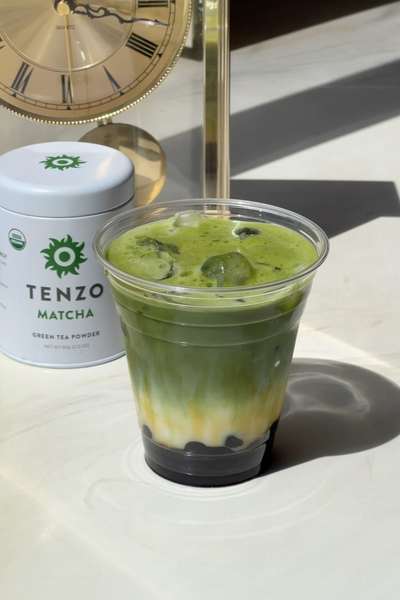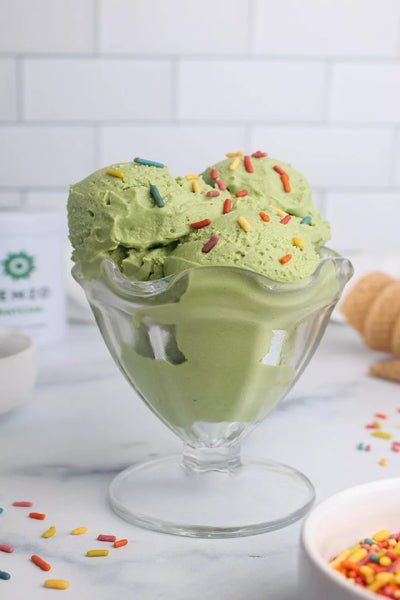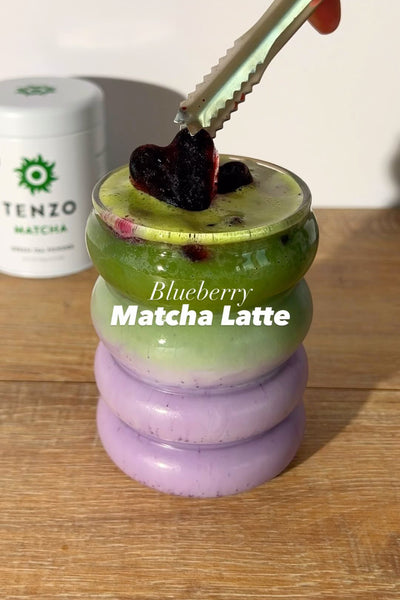What is Tea? History, Types, and Trends

When you’re having a long day or you’re looking for a morning pick-me-up, tea is a great option. There are many different types of teas available today, and tea can be an excellent homeopathic remedy for many common conditions and ailments.
Tenzo tea is here to help you find the best tea options and recipes for your overall health and wellness. We’re proud and excited to share the beautiful history of matcha tea and how it can help to provide you a low-impact energy boost, as well as refreshing antioxidants that support a healthy immune system, oral hygiene, and more.
Here’s a peek at all types of tea and why we love matcha.
What is Tea?
You probably have boxes of tea in your cabinet at home, or you’ve seen the long aisles of tea options at the grocery store. But what exactly is tea, and how did it evolve into what we brew today?
There are many different types of tea, and their impact, caffeine content, flavor, and benefits will vary greatly depending on where it was grown and how it was produced. At its most basic, however, most tea is derived from a plant known as the camellia sinensis, which first appeared in China.
It can be prepared in many different ways, and we even recommend dessert and smoothie recipes that call for matcha powder, but the most common method for making tea is to steep the leaves in hot water, similarly to how tea was first developed.
Matcha is unique in this way, in that the tea leaves are ground into a fine powder and then mixed directly into the water, which creates a bolder flavor and more long-lasting effects.
Tea can be used for many different purposes, beyond simply being a delicious addition to your afternoon break. Many teas are high in caffeine, which can provide an energy boost to start the day or when you’re feeling sleepy at school or work.
Tea is also known to provide health benefits. Certain teas can help to reduce nausea or menstrual cramping, support joint pain relief, and boost immune system health. If you are managing the effects of stress or struggling to fall asleep at night, herbal tea can help to sooth and relax the mind and body alike.
The History of Tea
Tea is available in every corner store today, but that certainly wasn’t always the case. The history of tea is long and wide, as tea has been influenced by and influenced many countries and cultures around the world.
It is said that tea dates back several thousand years, to southwest China, where, according to legend, the Emperor Shennong was boiling water when several tea leaves floated into his drink.
Pleased by the bold flavors, he began experimenting with new ingredients, specifically with the intention of finding medicinal properties in tea, of which there are many. Because the history of tea is so old, it can be difficult to verify this story, but written texts and accounts indicate that tea has been consumed for several thousands of years.
As we know, tea is now available around the world. Monks and travelers began popularizing tea across Asia after its discovery, and when western merchants and colonizers arrived in China in the 1500s, they took tea back to Europe with them, where it would become a staple. New Americans fighting for freedom even used tea as a way of rebelling against English rule, during the Boston Tea Party of 1773.
Common Types of Tea
Over the years, unique ingredients and production methods have led to many different flavors and types of tea, which have their own properties and benefits. Here are some of the most common types of teas and why we love them.
Black Tea
The camellia sinensis has two main varieties, oolong tea and black tea. If you’re ever on the search for a pick-me-up then you’ll want to turn to a cup of black tea, since it’s more caffeinated than most other options and often comes with the bolder flavoring.
Black tea is referred to as red tea in China, due to the color it turns during the oxidation process. Because it maintains its flavor for much longer than white or green tea, it was the most commonly traded tea throughout history.
While you always want to speak with your health care professional before beginning or slowing a treatment, black tea has many medicinal properties that can boost overall health and wellness with few side effects. It has been shown to be helpful for heart health, oral hygiene, and even the digestive system.
If you’re looking for a refreshed, healthy appearance for your hair or skin, black tea is a great choice, as well.
Green Tea
Matcha tea is a type of green tea, but it’s not the only one. Green tea has a much gentler production process than black tea, which means that it maintains even more of its nutrients and medicinal benefits, while still providing gentle energy boosts and great flavors. While it has some caffeine, it can be as little as half the caffeine content as black tea, so you won’t need to worry about any of the mid-day caffeine crashes or slumps.
It is always important to consult a medical professional about your health needs, but adding green tea to your diet can be beneficial in many ways. It has been shown to support heart health, boost your immune system, and even reduce irritations, which can be helpful on weight loss journeys.
And it supports mental health and emotional wellness, as well. Green tea can be helpful during periods of stress, as it is equipped with soothing, calming properties and can even serve as a natural approach to managing stress.
Herbal Tea
If you’re on the search for a no-caffeine tea option that can reduce your stress, provide calming, soothing effects, and even make it easier to sleep, then you’ll want to reach for an herbal tea—and you have lots of great options.
Herbal tea is flavored in many unique ways, from roots to flowers to fruits, so you’re bound to find a variation that you can enjoy.
Different types of herbal teas can be beneficial for different reasons. Ginger can help with nausea, chamomile is soothing for menstrual cramps, and peppermint tea can support healthy digestion.
White Tea
White tea is the best of green and herbal teas all rolled into one. While it's much gentler than other variations of tea, and the flavors are usually soft and subtle, white tea does still have a hint of caffeine, so you won’t want to drink it just before bed.
That said, it is much more delicate than other varieties of tea and has many beneficial qualities, including support for bone health, oral hygiene, and immunity.
Matcha Tea
There are many benefits to drinking matcha tea, whether it’s for your morning focus, afternoon energy boost, or even before bed.
Matcha tea is a type of green tea, but unlike most other teas, matcha tea is ground into a fine powder and actually mixed into the hot water, rather than being steeped. The effect of this is that matcha tea provides longer lasting and more effective energy support, without any associated caffeine crashes or fatigue afterward.
Not only does it make for a great beverage, but it can also be mixed into all of your favorite recipes, like brownies, smoothies, and ice cream. It’s rich in antioxidants, helpful for reducing feelings of stress and restlessness, and can support healthy hair, nails, and skin.
Conclusion
There are many reasons you’ll want to add more tea to your lifestyle. With so many unique variations and types to pick from, you’re sure to find a tea that you love—and matcha is a great option. Matcha tea is a type of green tea, which means it has a moderate caffeine level, but still provides refreshing, energizing, and delicious flavors. When you drink matcha tea, you’ll get all the benefits of the caffeine, but they’ll last longer than your regular cup of coffee and you won’t have to worry about a caffeine crash later in the day.
In addition to matcha, you’re sure to enjoy tea types like white tea, black tea, and traditional green tea—and Tenzo Tea wants to provide all the information you need on matcha tea and your other great choices. We’re dedicated to sharing our experiences and expertise surrounding tea with you.
Explore our options and brew the first cup of matcha in your kitchen today.
Sources:
All About Tea Plant (Camellia Sinensis) | The Spruce
'The history of tea', Chinese Tea | China.org
The Hidden Health Benefits of Tea | Penn Medicine
Molecular evidences of health benefits of drinking black tea | NCBI










